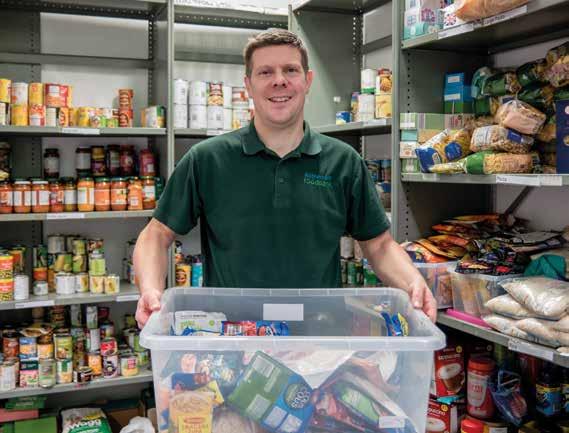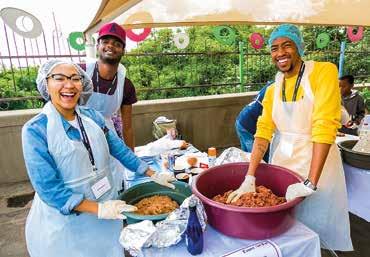
3 minute read
Co-operative action
by Quids in!
PANTRIES AND FOOD CLUBS
Meanwhile, food clubs and pantries are popping up all over the UK.
Advertisement
Food Clubs are normally found in children’s centres. We will typically pay an annual £1 membership fee and weekly payments of £3.50 which gets us approximately £15-£20 worth of food. Members will have access to a support network and cookery lessons.
Pantries are located in churches and community centres. They work on a local membership model too. We pay a couple of quid per visit and are entitled to a basket of groceries worth up to five times more. Pantries work in partnership with the charity FareShare and local wholesalers, who provide surplus food and other items.
In South Kensington, London’s wealthiest borough, people are struggling to buy good quality food. “Need in South Ken is very hidden,” says Alice Webster, community investment manager at Southern Housing Group, and the driving force behind the Ixworth food pantry.
Ixworth Place estate is one of the largest in the borough, with over 250 homes. A dilapidated storage room on the estate was turned into a pantry. The pantry is open three days a week and has over 100 members. Food is labelled in a traffic light system (red, amber, green), relating to availability and stock.
The quality and variety of food is what makes the pantry so special. One week there was a surplus of sirloin steaks, another week it was pumpkins.
The pantry has connected neighbours, “This type of model tackles the issue of self-isolation and that is so important in today’s world,” says Alice. ¬ To find your nearest local pantry, check on the map here www. yourlocalpantry.co.uk/find-apantry/?page=2

CITIZENS SUPERMARKETS

Citizens’ Supermarkets are large facilities which have a community cafe and advice hub. Some have cookery and IT classes on-site, as well as second hand furniture shops. Usually we are referred by our housing provider, agency or we can self refer. Some supermarkets have a pay-per-item system at the checkout while others ask for a flat fee in return for a range of items. Food is heavily discounted, using surplus stocks from retailers and manufacturers.
You can find citizens supermarkets in Birkenhead, Coventry and Bradford. There are plans for new openings in Glasgow, Norwich, and Sheffield too.
In some parts of the UK there are ‘mobile’ citizens’ supermarkets – that's a double decker bus kitted out with a shopping area, advice booth and cafe.
FOOD BANKS
A food bank is a storehouse for millions of pounds of food and other products that are donated by the public. Volunteers sort the food into parcels. In times of emergency, health visitors, schools or social workers can give us a voucher which entitles us to a food bank parcel worth three days of food. The Trussell Trust is the largest food bank network in the UK with over 1,200 food bank centres.

Gary Nash set up the Eat or Heat food bank in Walthamstow, East London, nine years ago. It is now part of a bigger network, with banks in Chingford and Leyton. “Little did I know back then that we would end up with three food banks open, in total, six times a week,” he says.
Eat or Heat is not funded by the council. It relies solely on the community to raise money or donate food. People are referred to Eat or Heat from over 400 organisations including the NHS, Citizens Advice and the council. People receive three days worth of food per week, for a limited amount of time.
Food banks are often criticised but if run properly they can be a lifeline for many of us. “We don’t want to create a problem around dependency,” says Gary. Eat or Heat can refer people back to a professional who can help find a longer term solution.
In lockdown the three food banks became distribution centres. Gary reached out to the local community. The response was staggering. At one point there was so much food they had to open up an extra storage room. “The community kept us going. I never realised how strong it was.”
SOCIAL SUPERMARKETS

Here, we can pay for food at a heavily reduced rate that can be as low as 30p for every £1 you would spend in a normal supermarket. They know their customer base and who needs that bit of extra help. Social supermarkets aim to be completely sustainable and use local suppliers.










